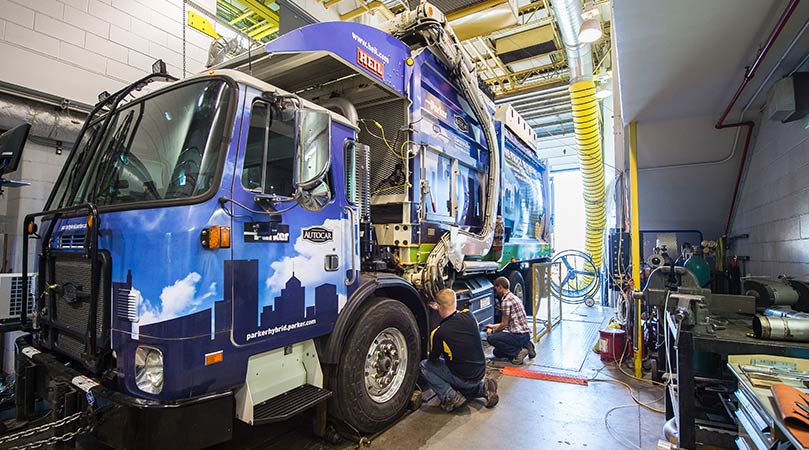Heavy-Duty On- and Off-Road Vehicle Emissions and Fuel Economy
For heavy-duty vehicles, both on- and off-road, NREL's extensive engine- and vehicle-based research quantifies and validates the fuel economy and emissions impacts of advanced fuel formulations and combustion strategies.

We conduct most of this research at the Renewable Fuels and Lubricants (ReFUEL) laboratory. Typical studies look at the performance, fuel consumption, and nitrogen oxide (NOx) emissions tradeoffs of biofuels, such as biodiesel, renewable diesel, or advanced fuels from biomass pyrolysis or hydrothermal liquefaction.
Combustion Impact Studies
In addition to fuels formulation and combustion impacts, a single-cylinder research engine is available for combustion impact studies (ignition and combustion phasing, exhaust gas recirculation tolerance, and NOx-soot tradeoff studies), while a multicylinder engine dynamometer is used for fuel efficiency and emissions over transient cycles and to evaluate fuel effects on emission control catalysts and filters.
For more information, see Impacts of Biofuel Blending on MCCI Ignition Delay With Review of Methods for Defining Cycle-by-Cycle Ignition Points From Noisy Cylinder Pressure Data, SAE International Journal of Fuels and Lubricants (2022).
Fuel Consumption Performance Evaluations
A heavy-duty chassis dynamometer at ReFUEL allows researchers to evaluate the fuel consumption performance of electric-drive vehicles, including hybridized powertrains and electrified auxiliary loads or power takeoff requirements for work trucks.
Real-World Emission Measurement and Evaluation
On-road fuel economy and emission impacts are researched using portable emission measurement systems and on-road cost-down techniques to evaluate real-world emissions fuel properties as well as the fuel economy impact of aerodynamic improvement devices.
Contact
Share
Last Updated March 3, 2025
